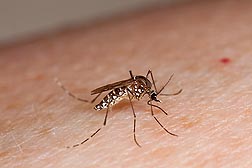|
|
USDA Pest Management Program Targets Virus-transmitting Mosquitoes
By Sandra Avant
February 3, 2016
U.S. Department of Agriculture (USDA) scientists and their collaborators recently completed an area-wide pest management program targeting the Asian tiger mosquito (ATM), Aedes albopictus, which can transmit viruses such as dengue, chikungunya, yellow fever and Zika.
The six-year project, which demonstrated effective strategies to control the ATM in New Jersey, was a partnership between researchers at USDA's Agricultural Research Service (ARS) Center for Medical, Agricultural and Veterinary Entomology (CMAVE) in Gainesville, Florida; Rutgers University in New Brunswick, New Jersey; and the Mercer and Monmouth County Mosquito Control agencies. Entomologists at CMAVE's Mosquito and Fly Research Unit also worked with economists at Brandeis University in Waltham, Massachusetts, to convey important public health and socio-economic benefits of mosquito control.
Aedes albopictus is common along the East Coast and is one of the area's most common mosquito pests, according to CMAVE director Kenneth Linthicum. The research team tested existing control methods and developed new strategies, which included ways to treat immature mosquitoes that breed in small containers such as flower pots. The technologies developed, implemented, and found to be effective will also be used to help control these mosquitoes in other locations.
CMAVE's Mosquito and Fly Research Unit has a long history of developing novel strategies and approaches for surveying, controlling and protecting people from nuisance mosquitoes as well as those that transmit pathogens, according to Linthicum. Scientists also conduct research on another species, Aedes aegypti, believed to be the primary vector of Zika virus in South and Central America. There is no vaccine for the Zika virus, which makes mosquito control critical. Aedes aegypti primarily feeds on humans, while Aedes albopictus has a broader host range that includes animals.
In the United States, Aedes aegypti occurs in Florida and along the Gulf Coast into Texas. Small populations are also located in Arizona. In the last two years, this mosquito has been found in California around Fresno, the San Francisco Bay area, and in several counties in southern California. Unlike many other species in the United States, both Aedes aegypti and Aedes albopictus bite readily in daylight.
ARS studies these two mosquito species and others. Research includes developing and testing effective repellents, discovering and creating molecular pesticide technologies that prevent mosquitos from reproducing, exploring natural product remedies to deter pests, and using toxic sugar-based baits to lure and kill mosquitoes.
According to Linthicum, people can take three simple but important steps to protect themselves against mosquito bites: wear proper clothing that covers the body; apply mosquito repellent when engaging in activities outdoors; and drain any standing water from around houses that could become a breeding site for these mosquitoes.
ARS is USDA's principal intramural scientific research agency.

